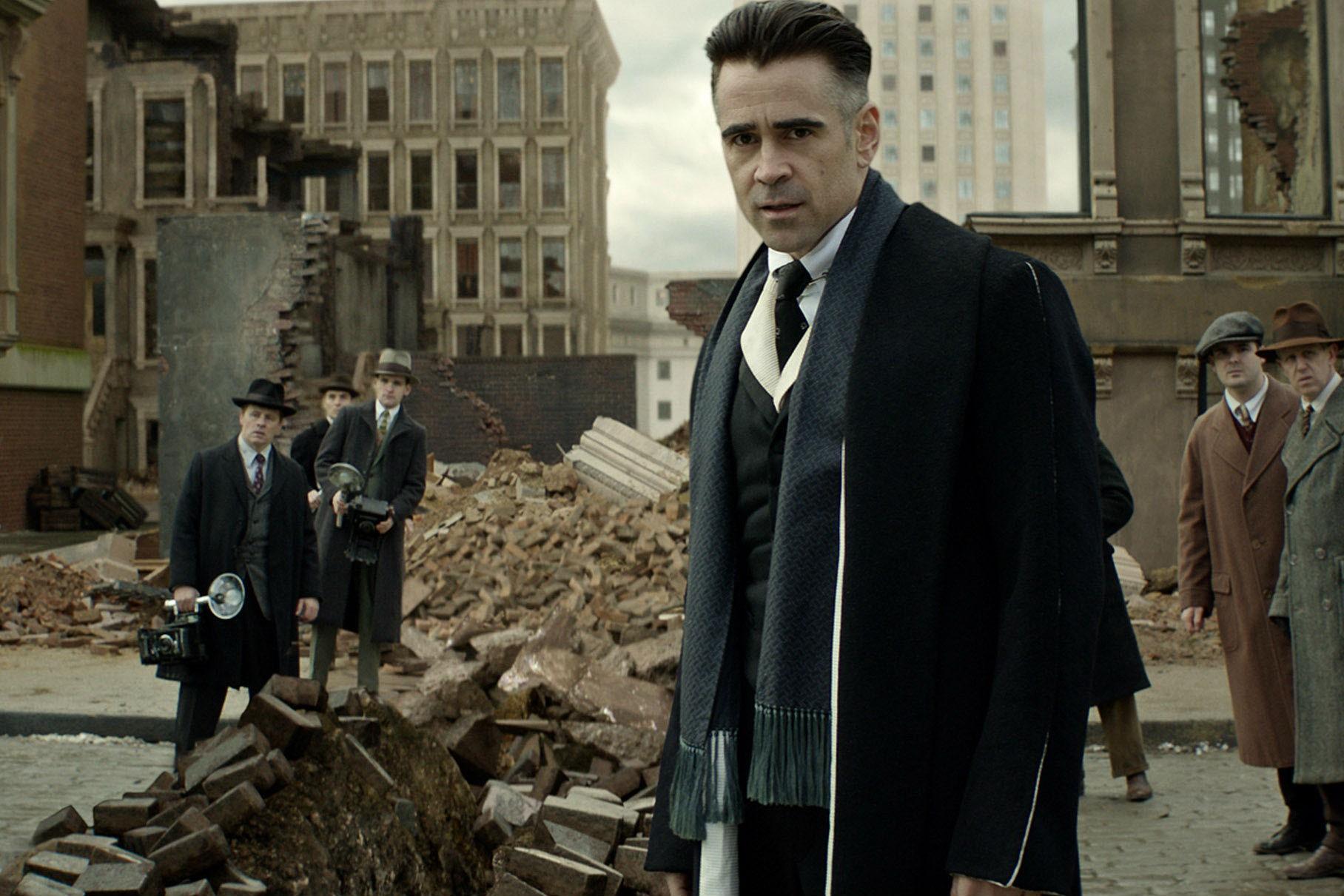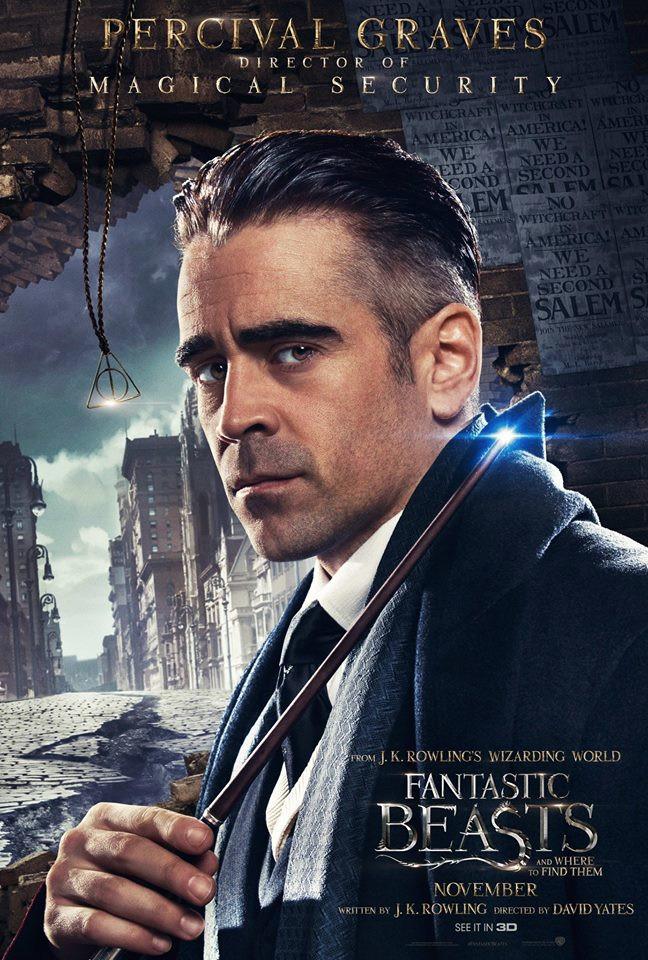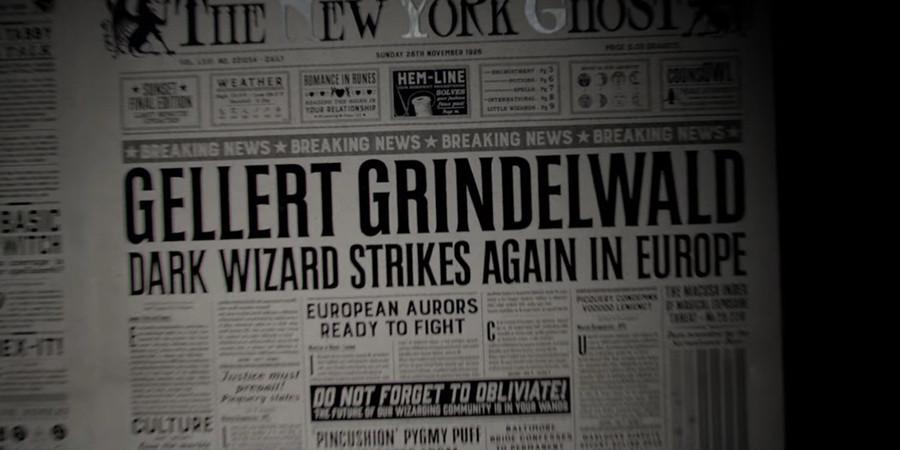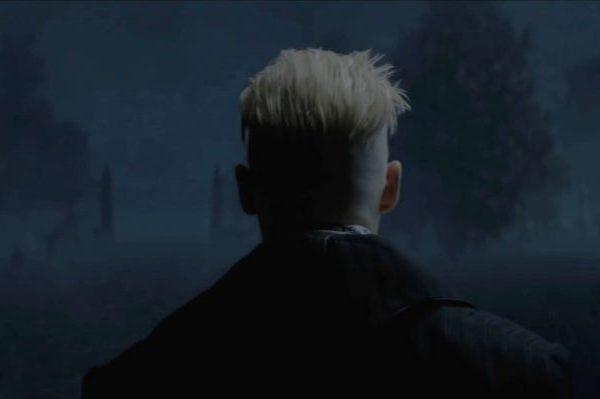
Spoiler warning: If you have not yet seen Fantastic Beasts and Where to Find Them or want to avoid speculation about the future of the five-part series, cast a Shield Charm over your eyes; we’ll use the Muffliato spell to keep your ears safe.

The Potterverse is back, folks, and it’s older, more American, and furrier than ever. Fantastic Beasts and Where to Find Them hit theaters this weekend, much to the delight of The Ringer’s muggle — ahem, no-maj — Potter fans. Yet in a film about Newt Scamander’s magical menagerie, the most shocking moment had little to do with our hero from Hufflepuff. Rather, it hinged on Percival Graves (Colin Farrell), the film’s main antagonist and the U.S. director of magical security, proving to actually be Gellert Grindelwald (Johnny Depp) in disguise.
Depp’s role as Grindelwald, the proto-Voldemort who terrorized continental Europe before losing a duel to Albus Dumbledore in 1945, is not a surprise; his presence in this film, however, qualifies as a significant climactic twist. Our Potterheads were split on the surprise — its execution, its fit with canon, and its meaning for the future of the Beasts series — and have taken to their respective corners for their own sort of duel. Their quills are sharp, their inkwells full. Loser goes to Nurmengard.
Zach Kram: Hello, Mal. Are you doing well today? Got your wand at the ready and your owls in a row? Because I’m sorry to say that your defense of the Depp-as-Farrell switcheroo is mistaken — for a number of reasons, but I’ll start with its build-up and execution. A good twist doubles as a puzzle the audience didn’t necessarily know it was solving, with subtle clues throughout the movie informing the surprise and the reveal representing the final piece. A bad twist plops the whole completed picture right on the table but forgets to break it up into jigsaw pieces beforehand.
What did we learn about Graves that might have hinted at his actual identity? He carries a necklace with the symbol of the Deathly Hallows, which is also Grindelwald’s personal mark. That’s the only one I remember. Convince me that I overlooked something that made Depp’s appearance a fulfilling payoff, rather than a shock for shock’s sake.
Mallory Rubin: Oh, Zach. If Professor Trelawney taught us anything, it’s that the Inner Eye does not See upon command. Luckily, I didn’t need my divination skills during Fantastic Beasts, because J.K. Rowling and David Yates left as many fragrant droppings as the critters in the Hogwarts Owlery.
First of all, you’re way underselling the magnitude of the Hallows pendant. That’s a Grawp-sized clue! As the film’s opening montage of newspaper clippings confirms, Grindelwald has reached full Big Bad status at this point. While his personal emblem wasn’t identifiable to Harry and Co. many moons later, during the height of Grindelwald’s power it would have been recognizable far and wide, even in America. Would a student not affiliated with the Death Eaters casually doodle the Dark Mark during Harry’s days? Of course not, and this is no different. Plus, it’s not just that Graves is carrying the sigil. He’s using it the way Voldemort later uses his own symbol: to summon with a touch. Graves’s affiliation with the sign of the Deathly Hallows is a massive red flag, and one that began drawing suspicion more than a month ago, when the necklace made a notable cameo on his newly released character poster.

But if that’s not enough for you, rest assured, I have as many additional clues as Dudley has birthday presents. Did you fail to notice the way the camera focuses on Graves’s face when Grindelwald’s name was mentioned in the MACUSA chambers? It’s very quick, but it’s there. And how about the entire Graves-Newt exchange in the interrogation chamber? Why would Graves, an American official, care about Dumbledore’s feelings for Newt? BECAUSE HE’S DUMBLEDORE’S ESTRANGED BESTIE IN DISGUISE! That same grilling features a very notable “for the greater good” mention; Newt makes it, full of venom, but it causes a flame to ignite in Graves’s eyes. It would: It’s his saying, the lie that he tells himself to justify his crimes. And then there’s the way Graves speaks to Newt about the Obscurus: “So it’s useless without the host?” It’s impossible to hear this and not wonder if Graves is evil, with designs to “provoke war between the magical and non-magical worlds,” as he accuses Newt of doing in a way we now know is leading, even hopeful. Of course, being evil doesn’t necessarily mean being Grindelwald. But focusing on what happens when oppressed magic consumes the life of a child might. Or have you forgotten about young Ariana Dumbledore already?
Later, Newt wonders aloud about Graves’s background. This is for our benefit as much as his, a push to question what we’re seeing and hearing, to wonder what secrets are hidden in this particular chamber. Speaking of background: Need I remind you that “Percival” is Dumbledore’s father’s name and one of Dumbledore’s middle names as well? Grindy’s “Percival Graves” pseudonym is half Dumbledore homage, half love letter to death.
And then, of course, there’s the hair! This isn’t Los Angeles in 2016! Not everyone has a hipster undercut! But Graves and the Grindelwald we see in the film’s opening moments have similarly expertly maintained ’dos. This would be a sloppy oversight if it weren’t so clearly intentional, a visual association that’s meant to gnaw at our minds.
None of this is as heavy-handed as the constant Goblet of Fire Barty Crouch Jr./Mad-Eye Moody tongue dart that even dolts like Crabbe and Goyle could have spotted. But it’s there, subtly but ever present, like a loving magical creature by our side.
Z.K.: I’m glad you mention the Crouch-Moody parallel, which I couldn’t help but use as a comparison for Grindelwald-as-Graves. Because maybe there were some lingering camera shots and confirmation-bias-y flashes of anger in Farrell’s eyes in Beasts, but we know from Goblet of Fire that Rowling can write more substantial clues.
She didn’t just reveal Crouch as Moody with tongue flicks. Rather, the character repeatedly swigs from his flask, in a world in which Polyjuice Potion exists; Crouch’s name mysteriously appears on the Marauder’s Map, in Snape’s storeroom; and he focuses intently on Neville when demonstrating the Cruciatus Curse, just chapters before readers learn that Crouch performed the same curse on the Longbottom parents. Those are all meaningful, and the twist answers why those details appear in the text. In Beasts, per your explanation, the twist answers why the camera focuses on the movie’s main antagonist at certain points — a question I didn’t realize needed answering.
I’ll grant you that the Hallows mark is a sizable clue, and your etymological breakdown of “Percival Graves” is fascinating (though I happen to believe that Grindelwald assumed the identity of a real Auror in an attempt to infiltrate MACUSA, rather than spending his time wading upward through American wizarding bureaucracy; the evidence isn’t undeniable either way). But even if the twist worked in this film, does it do the same for the series as a whole? The plan is for it to end in 1945, so if we’re going to end up with young Dumbledore battling Depp in Central Europe, why are we in America at all? Why is Newt Scamander here at all? I can’t help but be concerned that the central villain’s connection to the protagonist is merely incidental, or that Rowling created a whole new wizarding society, complete with Pottermore write-ups and imagined fight songs, only to abandon it after just one film. Already, Yates has said that the sequel will feature fewer magical creatures and a European locale — which removes the two best elements from the first Beasts flick. What gives!

M.R.: We don’t yet have enough info to confidently say whether G.G. crafted a false identity or stole someone else’s. I’d totally buy both scenarios: Either Grindy’s so arrogant that he (rightly!) thinks no one will notice his clever nod, or J.K.R. is so smooth that she gave us another Lupin-style clue. Regardless, it’s dope.
I’m more interested in talking through your Goblet of Fire points, because I want to be absolutely clear on two things: (1) The book build-up and reveal is brilliant; the movie is ham-fisted and sloppy and insultingly blatant in that regard, and that’s what makes the gentle but effective approach in Beasts all the more impressive.
More pressingly: (2) One of the greatest things about Goblet, film and book alike, is how it shows us the vastness of the magical world: Wizarding schools in other countries! Dragons from lands far and wide! A Quidditch World Cup between nations! Magic and history that we’ve never seen, implications that we can’t possibly anticipate or understand! Hogwarts will always be home; Britain will always be the best. But it’s thrilling to see J.K.R.’s world widen beyond that.
I don’t think we’re through with America yet, because Jon Voight’s Shaw Senior is going to want vengeance for his son’s death, Newt’s going to want to make good on his promise to hand-deliver Tina her book, and I’m going to want to see Jacob’s latest pastry designs. Plus, Grindy is presumably in MACUSA’s care. (He can’t go to Azkaban, right? Going would mean breaking out, and we all know that Barty Jr. was the first to do that!) We’ll see these people and this place again. And even if that return is brief, our time in New York won’t feel like a waste. It will still feel like a gift, a blessed insight into wizarding life in a different society at a different time. And I’ll greet the second installment’s reported visit to Paris with the same open-minded spirit. What can I say? Like Frank, I want to fly free!
Of course, despite your anti-Newt trash talk, flying free is part of our man’s charm as a leading light: He’s a jet-setter, a world traveler, as hungry for knowledge and insight as is yours truly. Presumably, Newt’s excursions won’t be sideshows, but rather vehicles for acquiring information that proves vital in thwarting Grindelwald in the great duel to come. It’s no accident that Dumbledore’s affection for Newt is established here; I happen to recall another animal-loving expelled Hogwarts student who played quite a crucial role the last time Dumbledore helped thwart a great evil! (Keep doing you, Hagrid.) It’s also no accident that Newt is referred to, coldly, as the other Scamander brother, not the war hero. Maybe he’ll become one yet.
We could have just gotten Dumbledore’s complete history in these films. We could have just gotten a fresh tale. Either would have been fun and fascinating, because wizards are freaking cool, especially when J.K.R. writes about them. But here, we’re getting the best of both worlds: new characters populating a fresh story that breathes with its own implications and life, plus a meaningful, undeniable connection to something we all already deeply care about. We’re getting the Millennium Falcon and the lightsaber, but a whole new bundle of Jedi mind tricks, too. How can you possibly try to tear that down?
Z.K.: To be clear, I don’t want to suck out the fun. I’m not being a Dementor on purpose. But I can’t help myself — I think the journey through the vast magical world is important, but the European destination matters, too. And Grindelwald’s portrayal is alarming in that regard.
First, a prediction: If this film represents his Beer Hall Putsch moment, he’ll be out of prison in about a year, having crystallized his extreme ideology in the interim. And maybe he’ll escape to wreak some more havoc in the U.S., or maybe he’ll cut his losses and return to the Continent. Either way, he is poised to pose an existential threat to the worldwide wizarding community, and I remain unconvinced that Newt’s raison d’être — intellectual enlightenment and a care for magical creatures — would involve him in the ultimate battle between good and evil.

Perhaps, as you write, he will help Dumbledore discover something about Grindelwald that will help in the duel. But after watching Grindelwald for two hours this weekend, I think we already know enough about the dark wizard’s magic: He’s not especially great at it. Sure, he stuns a few Aurors at the end, but over the course of the film’s climax, he also struggles to defeat or is defeated by a zoologist-slash-writer, a magical butterfly, and a teenage boy who didn’t know his parents and lived in an abominable foster environment. (OK, so maybe he and Voldemort have a good deal in common.)
“They say, still, that no Wizarding duel ever matched that between Dumbledore and Grindelwald in 1945,” Elphias Doge writes in Deathly Hallows. “Those who witnessed it have written of the terror and the awe they felt as they watched these two extraordinary wizards to battle.” Remember that this assessment came after Dumbledore, with the Elder Wand at his side, battled Voldemort in the Ministry’s lobby in Order of the Phoenix. In other words, Grindelwald is supposed to be a more equal match for Dumbledore than even He-Who-Must-Not-Be-Named! He is supposed to radiate terror and awe! And he can’t cleanly handle a man named Newt!
Voldemort, on the contrary, sees his legend build from the early pages of Sorcerer’s Stone. The dread surrounding him is visceral, his character dark, frightening, and emphatically villainous, to the point that when he appears, finally corporeal, in that graveyard in Goblet of Fire, we know the stakes, and we know his capacity for terror. (Not to get all Cursed Child on you, but “Kill the spare” solidified some things.) Yet now, when Grindelwald begins his European campaign, any element of fear will be tempered with annoyance that the good guys don’t just send a kaleidoscope — yes, that’s actually the collective term — of butterflies to curtail his threat.
Beasts was a dark film, tonally, with a muted color palette and eerie images dominating the screen. The finale takes place in a darkened train station as a black cloud circles overhead. But that tone emerges entirely from the cinematography, not from the villain himself. Convince me I should be scared of Grindelwald for reasons other than “I know he’s supposed to be scary,” and I’ll relent in my pessimistic take.
M.R.: Zach. When your argument hinges on Dogbreath Doge, I’m not sure that I can help you. And yet I’ll try, once more, to shine my light onto the stubborn Devil’s Snare that is your anti-twist position.
YOU’RE AS BAD AS VOLDEMORT! What mistake did Moldy Voldy make time and time again? Underestimating those he thought beneath him! Would it shock you at all to learn that Grindelwald also failed to fully respect those he considered his inferiors? That he turned his back on Newt because he, like you, discounted the magizoologist’s worth, thinking that “intellectual enlightenment and a care for magical creatures” failed to make him a worthy foe? (I guess I know what you think of me now, Zachary!) Well, guess what: Newt is gifted. Remember what he said when future bae Tina asked how he captured the demiguise? “With immense difficulty.” He can do hard shit! Newt isn’t a pushover; he’s a badass. Just because he isn’t using his talent to run a country or oppress people doesn’t mean he’s feeble. Grindy learned this to his peril. You’d be wise to learn it, too.
It’s also important to note that this wasn’t a one-on-one showdown. Graves was busy trying to fight his way through a pack of Aurors, presumably the most gifted fighters in New York, when Newt got him from behind. Unlike the dearly departed Prof Quirrell, Grindelwald, while powerful, doesn’t have eyes in the back on his head.
What’s more: You speak of Voldemort’s legend, but you fail to acknowledge that our original cherished tale begins when a 1-year-old tot (with a helping hand from that fabled warrior, love) bests him. Our fear isn’t immediately a given; it builds as we learn of Voldemort’s past atrocities and watch him slither his way back to power. Doesn’t it excite you that Beasts is setting up to give us Grindelwald’s version of this arc?
Part of what makes J.K.R.’s bad guys so interesting is that they’re so deeply flawed. Our boy got kicked out of Durmstrang, yet Dumbledore considered him an equal. Grindy messed up the one good thing in his life, yet managed to keep his shit together long enough to find the Elder Wand. He wound up a prisoner, but we know that he’s going to rise again, because we know that he’s going to be one half of that legendary duel you can’t stop talking about. The terror, the power, the import — that’s all guaranteed. The way we get there isn’t, and that’s the fun part.
Z.K.: That’s not a bad line, and I certainly hope you’re right. Plus, this argument somehow devolved into me hating animals and knowledge. I’m not entirely sure what happened or how you Confunded me, but quitting now would be for the greater good.
M.R.: That’s the spirit, friend. Never forget: We’re stronger together. What would the Sorting Hat say if it heard us bickering like this?
And we must unite inside her
or we’ll crumble from within
I have told you, I have warned you
let the Sorting of Kowalski’s baked goods now begin

